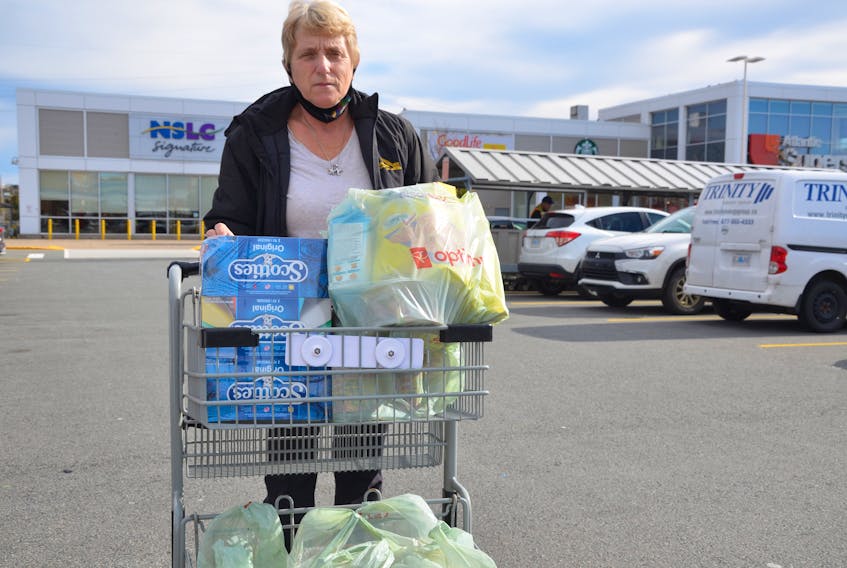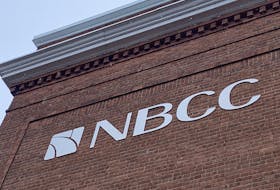The plastic bag’s long run as a reliable appendage for Nova Scotia grocery shoppers is coming to an abrupt end.
Effective Friday, businesses in the province will no longer be able to provide single-use plastic shopping bags at the checkout.
“I think it’s a good thing -- I have small grandchildren -- for the future,” said Bridgid Bowers, emerging from the Atlantic Superstore on Joseph Howe Drive in Halifax early Wednesday afternoon with her cart laden with several plastic grocery bags.
Bowers, from Dartmouth, says she does her share of composting and recycling and carries reusable bags in her car.
“I didn’t bring my bags in today because I was only planning on getting a couple of items.”
Bowers said she reuses the plastic bags to clean cat litter and for putting newspapers out for recycling.
Bowers said the disappearance of the plastic bag will not be much of an inconvenience for her.
“I’m getting used to it. WalMart does it, Sobeys does it. It’s going to take a little bit of getting used to for a lot of people. A lot of people, that’s all they use.
“Practice makes perfect.”

Sandra Wilson, leaving the Superstore shortly after Bowers, doesn’t agree with the ban.
“I am not a big fan,” said Wilson, who hails from Scotch Village in West Hants and was visiting her daughter in Halifax.
“The paper bags will break, you can’t put a lot in them,” Wilson said. “You end up paying more, you need more bags. For seniors, that’s a lot for them to try to put in their car. A plastic bag has handles, a paper bag doesn’t.
“The cloth ones are fine but you do have to pay for them. They do rip, they fall apart, so they don’t last. You could be coming from the store with pop or something, especially a senior, the bag rips open and down on the ground everything goes. It’s rough, it’s rough for people who have disabilities.”
The Superstore was selling green plastic bins with handles for $5.99 and different-sized cloth grocery bags for $2.49 and $1.99 Wednesday.
“They are good if you have a lot of muscle,” Wilson said of the plastic totes. “You gotta carry the stuff and the tote. You are putting extra weight.”
A spokeswoman for the provincial Environment Department said millions of plastic bags end up in Nova Scotia landfills every year, approximately 450 plastic bags per Nova Scotian.
“Banning the plastic bag at retail checkouts will reduce plastic waste at the source,” Barbara MacLean said in an emailed response.
"The paper bags will break, you can’t put a lot in them. You end up paying more, you need more bags. For seniors, that’s a lot for them to try to put in their car. A plastic bag has handles, a paper bag doesn’t."
Sandra Wilson
The purpose of the Plastic Bags Reduction Act is to encourage waste reduction at the source, she said.
“Our focus is on working with businesses to help them understand the ban, and the department has the ability to fine businesses if necessary,” MacLean said. “Businesses can continue to provide paper and reusable bags, and they can choose if they want to charge a fee.”
The single-use plastic bag is manufactured from ethylene, a gas produced from the combustion of coal, oil and petrol. The gas is processed into polymers, compressed into pellets and melted and molded into into long manufactured sheets. The reusable bag is made from cotton, canvas, nylon or polyethelyne.
Tony Walker, a Dalhousie University environmental studies professor, maintains that plastic bags should not be simply replaced by paper bags because that brings unintended consequences.
“Simply removing one type of packaging material and replacing it with another type of material, such as paper bags, it’s going to have an environmental footprint as well,” Walker has told The Chronicle Herald.
Jim Cormier, Atlantic representative of the Retail Council of Canada, said the balancing act for governments was not to create another environmental challenge while eliminating the single-use plastic bag.
“Scientific evidence is clear now that there is a bigger environmental footprint involved in making the paper bag than there is in making the single-use plastic bag,” Cormier said.
“The difference, of course, is at the other end, that the paper bag is fully compostable, recyclable, whereas the plastic bag is harder to deal with.”
Cormier said retailers, for the most part, are ready for the ban.
“We represent such a diverse group of retailers that some have taken steps over the last number of years to reduce their reliance on single-use plastic bags, some have eliminated them altogether and some have continued to forge ahead with the single-use plastic bags,” Cormier said.
“They all understood that the writing was on the wall and action was going to be taken on these types of bags. Many of them have, over the past number of years, been searching for alternatives. Of course, the idea being wanting to do so in such a way that you don’t upset your customers. Retail is such an ultra-competitive industry that they didn’t want to potentially make that type of decision on their own and then have a competitor use that as an advantage, to say ‘come shop with us, we still have them.’”
Sobeys eliminated plastic bags from its stores across Canada as of Jan. 31.
Cormier said when governments began to move into business of stipulating what types of bags could be used, retailers wanted to be consulted and they wanted any ban to be harmonized across municipalities, individual provinces and among neighbouring provinces.
“The worst-case scenario would be a municipal patchwork with neighbouring communities where one is doing it and one’s not and people get confused. That doesn’t help change hearts and minds.”
Cormier said all of retail sector’s requests were honoured, including having input in ban consultations, adequate time for retailers to prepare for bans and for certain exceptions to bans.
The Nova Scotia ban, which comes on the heels of similar prohibitions in Prince Edward Island, Newfoundland and Labrador and Greater Moncton, comes with several exceptions.
Businesses can still provide plastic bags for: loose bulk items like fruit, vegetables, nuts, grains or candy; food or baked goods that aren’t pre-packaged; small hardware items like nails, nuts and bolts; frozen foods, meat, poultry or fish, whether it’s prepacked or not; prescription drugs from a pharmacy; products that can’t fit in a reusable bag; transporting dry cleaning; packaging medical supplies and health services; wrapping flowers or potted plants; protecting tires; and transporting live fish.









